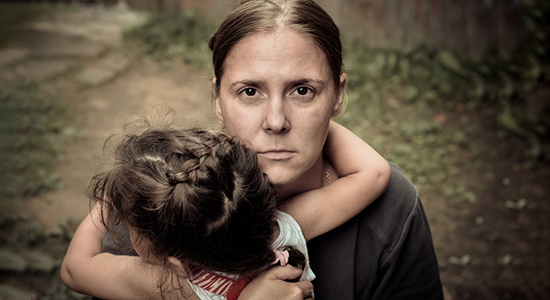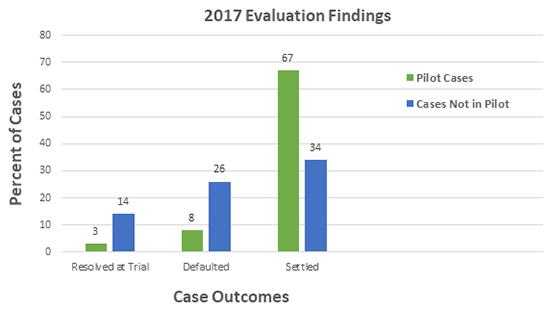
Sep. 5, 2018 – The U.S. has been slow to recognize that the right to counsel in civil cases for the indigent provides access to basic human needs.
Most other democratic, industrialized countries have a broad range of protections that include right to counsel for the indigent in civil cases.
For instance, in 1979, the European Court of Human Rights ruled that access to representation at no cost for low-income people in civil cases was a human right.1
Although the right to counsel in civil cases is not a human or U.S. constitutional right, all U.S. states and courts have implemented measures to create a civil right to counsel in limited circumstances (i.e., termination of parental rights).
The most exciting and recent developments in the civil right to counsel are in the eviction area. A recent book, Evicted: Poverty and Profit in the American City, published in 2016, was this year’s winner of the nonfiction Pulitzer Prize.
The book was based on author Matt Desmond’s ethnographic fieldwork on tenants and evictions in Milwaukee and has been instrumental in creating a national dialogue about the right to counsel in housing. This article covers two examples of the civil right to counsel in eviction cases and provides a brief history of the movement in Wisconsin.
California
In California, the Sargent Shriver Civil Counsel Act funded 10 right to counsel pilot projects in eight counties in cases affecting basic human needs (i.e., domestic violence, deprivation of child custody, housing, and elder abuse).2 A fee increase on certain post-judgment court services funded the pilots. Pilots began in 2012 and were slated to end after six years, but in 2016, legislation passed to make the pilots permanent.3
 Erica Lopez, U.W. 2010, is an attorney at Legal Action of Wisconsin, Madison, and a member of the State Bar of Wisconsin’s Public Interest Law Section Board. Reach her by email or by phone at (608) 256-3304.
Erica Lopez, U.W. 2010, is an attorney at Legal Action of Wisconsin, Madison, and a member of the State Bar of Wisconsin’s Public Interest Law Section Board. Reach her by email or by phone at (608) 256-3304.
In 2017, an evaluation presented to the California Legislature by the Judicial Council of California made striking findings that demonstrate an extraordinary improvement in the efficiency and effectiveness of the court system, providing evidence of tangible cost savings.
The study reported that representation helps indigent clients efficiently reach settlements and, thus, conserves limited judicial resources.4 Court proceedings were more efficient as representation dramatically reduced the number of continuances and trials, while also dramatically increasing the number of settlements across all case types.
The chart below is a visual representation of the difference in outcomes. The study also reported an increase in the durability of court orders along with an increase in litigant satisfaction.

New York City
The Right to Counsel NYC Coalition began its work in 2014, and it culminated in August 2017 when the New York City Council enacted a bill funding free counsel for low-income tenants facing evictions.5 Tenants with higher income will also receive brief legal assistance.
A major factor in getting the right to counsel bill passed was the economic savings the city expects to reap. The city commissioned a study by a financial firm, which predicted a savings of $320 million annually.6
Right to Civil Counsel in Wisconsin
Wisconsin has not had many victories in establishing the right to counsel after the legislature eliminated general-purpose state funding for civil legal services in 2011. Previously, the state appropriated $2.5 million in 2010 for civil legal services.7
It was no coincidence that in 2011, Legal Action of Wisconsin and the Legal Aid Society jointly filed a petition with the Wisconsin Supreme Court asking it to promulgate rules to clarify, and thus cement, the inherent power of the courts to appoint counsel in civil cases affecting basic human needs.8 A year later, the Wisconsin Supreme Court denied the petition.
In 2013, a new petition was filed seeking to establish a pilot project and create a rule appointing counsel in civil cases involving basic human needs.9 In response to this second petition, the Wisconsin Supreme Court voted in December 2014 to request that the Wisconsin Legislature establish a legislative study committee.10
A little after a year of no response from the legislature, in January 2016, the Wisconsin Supreme Court sent the legislature a letter warning that if the legislature did not act, the court would unilaterally create more funding to protect due process in certain civil cases.11 While the court did not act, it did publicly affirm that the court has the inherent authority to fund civil counsel. In April 2016, the Wisconsin Legislature established the Study Committee on Access to Civil Legal Services (the Committee).12 The committee’s aim is to review funding and delivery of legal services for the indigent in civil cases.
In March 2017, the committee reported its recommendations after exhaustive testimony from stakeholders at the state and national level.13 While the committee failed to address the right to counsel in civil cases, it did propose three bills for the 2017-18 legislative session:
-
A bill that allows, but does not require, various government agencies to allocate funds for civil legal aid;
-
A bill that creates an interagency civil legal aid coordinating council; and
-
A bill that allows district attorneys, deputy district attorneys, and assistant district attorneys to engage in pro bono.
The legislation fails to address the civil right to counsel or ameliorate the loss of state funding for legal services for the indigent.
Wisconsin: Eviction Defense Projects
Wisconsin’s legal service providers have always prioritized providing free representation to the indigent in eviction cases. In 2016, the Legal Services Corporation awarded Legal Action of Wisconsin (LAW) a Pro Bono Innovation grant.
The grant provided seed money for LAW to start its first Eviction Defense Project (EDP), sited at the Milwaukee County courthouse. The Milwaukee County EDP provides free legal assistance for eligible low-income tenants facing eviction with the assistance of volunteer attorneys and in partnership with the Legal Aid Society, among many other community partners.
In February 2018, LAW had a soft launch of its Dane County EDP in partnership with volunteer attorneys, the Tenant Resource Center, and the U.W. Law School's Neighborhood Law Clinic. At the Dane County EDP, eligible tenants facing eviction also receive free civil legal aid at the Dane County courthouse.
The legal assistance provided at both EDPs includes limited scope legal assistance, such as advice and counsel, settlement assistance/negotiations, document drafting (assistance with drafting motions or other forms pro se), and in-court representation. The Milwaukee County EDP has taken the model one step further and has since instituted a lawyer-for-the day project, where attorneys provide full representation for tenants in eviction court trials.
The Dane County EDP has assisted 122 households, and 15 volunteer attorneys have logged 208 total hours of legal assistance as of June 28, 2018.
The Milwaukee County EDP assisted 809 households with the help of 73 volunteer attorneys and 25 volunteer law students. Volunteers had logged a staggering 1,378.55 total hours of legal assistance as of the end of April 2018.
LAW’s Eviction Defense Projects demonstrate what an effective community partnership can accomplish. Government entities, the private sector, community organizations, and legal aid have converged to work toward stabilizing the community and making the best use of limited judicial resources.
Originally published in Forum for Justice, the newsletter of the State Bar of Wisconsin Public Interest Law Section (PILS), August 2018. Interested in joining the section? Visit the PILS webpage (login required) for more information.
Endnotes
1 See Airey v. Ireland, 32 Eur. Ct. H.R. (ser. A) at 305 (1979).
2 Cal. Gov. Code § 68650.
9 13-15 Petition to Establish Pilot Project and Create Rule Governing Appointment of Counsel in Civil Cases.
